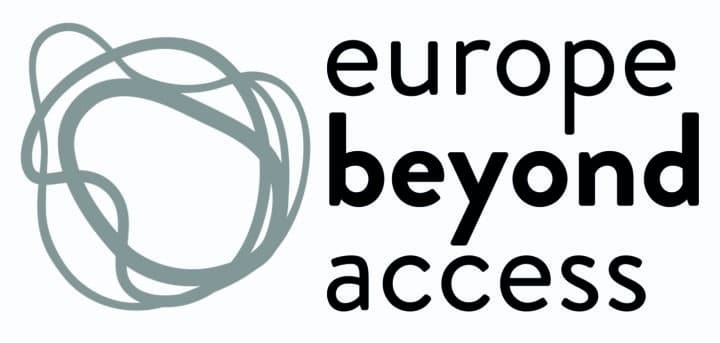Europe Beyond Access
Europe Beyond Access is the biggest trans-national project in the world supporting disabled and Deaf artists to break the glass ceilings of contemporary dance and theatre. The project started in 2018, and in 2024 the second generation has been co-funded once again by the Creative Europe programme of the European Union and will run for another 4 years, to 2027.
The new programme will
Commission and present dozens of new dance and theatre works created by artists with disabilities. 3 major international co-productions will sit alongside 19 other new commissioned works, and 20 presentations of existing touring works – presented across 10 countries.
Support artists with disabilities to internationalise their innovative artistic practices, and reduce the geographic and artistic isolation uniquely experienced by artists with disabilities. Hundreds of artists from across Europe will participate in Residences, Workshops and multi-national Artistic Laboratories.
Develop tools and understanding in the wider performing arts market – sharing our belief that the European cultural sector must urgently reduce barriers experienced by artists with disabilities.
We acknowledge that we are not specialist Arts & Disability organisations. We have a lot to learn if we are to become truly accessible cultural institutions. During the four years of EBA we will learn from experts and from each other – improving our own practices and sharing what we learn with the wider cultural sector. What we do know already is that artistically we are energised by the current generation of Deaf and disabled performing artists who are making innovative and excellent works. Through EBA we will support these artists, and bring their works to national and international prominence.
Europe Beyond Access is run by 10 high-profile European cultural organisations, which make up the EBA Consortium:
Skånes Dansteater (Sweden)
Holland Dance Festival (Netherlands)
Onassis Stegi (Grece)
Oriente Occidente (Italy)
Kampnagel – Internationales Zentrum für schönere Künste (Germany)
CODA Oslo International Dance Festival (Norway)
Centrum Kultury ZAMEK (Poland)
Project Arts Centre (Ireland)
Mercat de les Flors (Spain)
Culturgest – Fundação CGD (Portugal)
Europe Beyond Access is co-funded by the Creative Europe programme of the European Union. The project is joined by Associate Partner British Council (UK), who initiated and led the first Europe Beyond Access programme from 2018-2023. British Council now joins us to share news of the project across Europe and across the world. The British Council also supports the participation of UK artists within the EBA project. The project is also joined by the consortium of Big Pulse Dance Alliance – a large group of contemporary dance festivals strengthening and expanding the reach of contemporary dance. Finally, the project is joined by seven key European cultural networks and institutions – all committed to extending access in the cultural sector for disabled artists and audiences: IETM – International Network for Contemporary Performing Arts; European Dance Development Network; European Festival Association; On the Move – the International Cultural Mobility network; ELIA – European Network of Higher Arts Education; Flanders Arts Institute / Kunstenpunt; and UnLabel Performing Arts Company and Policy Exchange specialist.
Fore more information about Europe Beyond Access
visit the dedicated project website: EuropeBeyondAccess.com
Follow us on:
Subscribe to the project newsletter
** We use terms “artist with disability” and “disabled artists” interchangeably, with the awareness that different countries and languages use different terminology, and that people self-define as they prefer. Our approach is based on social model of disability, which recognises that people are disabled by attitudinal and environmental barriers in society, not by their impairment or difference.


Funded by the European Union. Views and opinions expressed are however those of the author(s) only and do not necessarily reflect those of the European Union or the European Education and Culture Executive Agency (EACEA). Neither the European Union nor EACEA can be held responsible for them.



